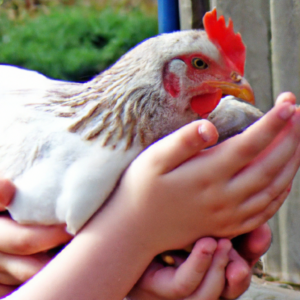
If you’ve ever considered starting your own backyard chicken coop, you may be wondering what it takes to successfully raise chickens. From providing a comfortable living space to ensuring their nutritional needs are met, there are a few basic requirements that are essential for raising chickens. In this article, we will explore the key elements necessary for creating a thriving environment for your feathered friends, allowing you to embark on the rewarding journey of raising chickens with confidence.

Housing
Coop size
When it comes to housing your chickens, one of the most important considerations is the size of the coop. Your coop should have enough space to comfortably accommodate all of your chickens, allowing them room to move around, stretch their wings, and engage in natural behaviors. As a general rule of thumb, you should provide at least 2-4 square feet of coop space per chicken. This ensures that your chickens have enough space to roost, nest, and move around freely.
Ventilation
Proper ventilation is essential for the health and well-being of your chickens. Good ventilation helps to remove excess moisture, ammonia, and odors from the coop, creating a healthier environment for your feathered friends. It also helps to regulate the temperature inside the coop, ensuring that your chickens stay cool in the hot summer months and warm during the colder winter season. To provide adequate ventilation, you can install windows or vents in your coop, making sure to protect them with wire mesh to keep predators out.
Nesting boxes
Nesting boxes are where your chickens will lay their eggs, so it’s important to provide comfortable and inviting nesting spaces. Each nesting box should be large enough to accommodate a chicken comfortably, typically measuring around 12×12 inches. It’s also important to keep the nesting boxes clean and filled with clean bedding, such as straw or wood shavings, to provide a cozy and hygienic environment for egg-laying.
Roosting bars
Roosting bars provide a place for your chickens to sleep at night. These bars should be placed at a height that is comfortable for your chickens to jump onto, typically around 2-4 feet above the ground. The bars should be wide enough for your chickens to grip securely with their feet, ensuring a stable and comfortable roosting spot. Providing roosting bars not only encourages natural behavior but also helps to keep your chickens safe from ground-dwelling predators.
Flooring
The flooring of your chicken coop should be easy to clean, hygienic, and provide good drainage. Many chicken owners opt for a combination of dirt and bedding materials such as straw or wood shavings. This provides a comfortable surface for your chickens to walk on and also helps to absorb moisture and odor. Regularly cleaning and replacing bedding will help to maintain a clean and healthy environment for your chickens.
Predator protection
Protecting your chickens from predators is crucial to their safety and well-being. Your coop should be built with sturdy materials that can withstand attempts by predators to break in. Ensure that all openings, such as windows and vents, are covered with strong wire mesh to prevent predators from gaining access. Additionally, consider installing an apron around the perimeter of your coop to deter predators from digging underneath. Providing a secure and predator-proof coop will give you peace of mind knowing that your chickens are safe.
Feeding
Feed types
Choosing the right feed for your chickens is essential for their health and productivity. There are different types of chicken feeds available on the market, including starter, grower, layer, and broiler feeds. Starter feed is designed for newly hatched chicks, while grower feed is suitable for young chickens that are still growing. Layer feed is specifically formulated for chickens that are laying eggs, providing them with the necessary nutrients for optimal egg production. Broiler feed is formulated for meat chickens, helping them grow and develop quickly. Be sure to select the appropriate feed for the age and purpose of your chickens.
Water supply
Water is essential for the overall health and well-being of your chickens. Ensure that your chickens have access to clean and fresh water at all times. Consider using a water dispenser designed specifically for chickens, such as a nipple waterer or a chicken waterer with a cover to prevent contamination. It’s important to regularly check and clean the water dispenser to maintain proper hygiene and prevent the growth of harmful bacteria.
Feeding schedule
Establishing a consistent feeding schedule for your chickens is important to ensure they receive adequate nutrition. Chickens generally need to be fed at least twice a day, once in the morning and once in the evening. However, the exact feeding schedule may vary depending on factors such as the age, breed, and activity level of your chickens. When feeding your chickens, make sure to provide enough feed for all of them to prevent competition or bullying. It’s also important to monitor their eating habits and adjust the amount of feed accordingly to avoid underfeeding or overfeeding.
Supplements
In addition to a balanced diet, chickens may require additional supplements to meet their nutritional needs. Calcium supplements, such as crushed oyster shells or eggshells, can be given to laying hens to promote strong eggshells. Grit, which is small stones or insoluble material, can help chickens digest their food more efficiently. Additionally, probiotics can be beneficial for promoting a healthy gut flora and boosting the immune system of your chickens. Consult with your veterinarian or a poultry nutritionist to determine if additional supplements are necessary for your flock.

Healthcare
Vaccinations
Vaccinations play a vital role in preventing and controlling contagious diseases in chickens. Depending on where you live and the prevalent diseases in your area, certain vaccinations may be recommended or required. Common vaccines for chickens include Marek’s disease, Newcastle disease, infectious bronchitis, and avian influenza. Consult with your veterinarian to develop a vaccination schedule that is appropriate for your flock and provides protection against the most common diseases in your region.
Parasite control
Keeping your chickens free from internal and external parasites is crucial to their health and well-being. Regularly inspect your chickens for signs of parasites such as mites, lice, and worms. Clean and disinfect the coop regularly to prevent the buildup of parasites. Use appropriate medications or natural remedies to treat and control parasites as recommended by your veterinarian. Additionally, providing a dust bath area for your chickens where they can roll and fluff their feathers in dry dust or diatomaceous earth can help prevent and control external parasites.
Disease prevention
Preventing the spread of diseases within your flock is important for the overall health and productivity of your chickens. Implement biosecurity measures such as quarantining new chickens before introducing them to the existing flock, regularly cleaning and disinfecting the coop and equipment, and practicing good hygiene when handling your chickens. Avoid contact with wild birds and other animals that may carry diseases that can be transmitted to your chickens. Regular monitoring of your flock for signs of illness, such as changes in behavior, appetite, or appearance, is essential for early detection and treatment of diseases.
First aid kit
Having a well-stocked first aid kit specifically for your chickens is essential for providing immediate care in case of injuries or emergencies. The first aid kit should include basic medical supplies such as wound dressing materials, antiseptic solutions, bandages, and a veterinarian’s contact information. It’s important to familiarize yourself with basic chicken first aid procedures and seek veterinary assistance when needed.
Veterinary care
Establishing a relationship with a poultry veterinarian is important for maintaining the health of your flock. Regular check-ups and consultations with a veterinarian can help identify any health issues and ensure proper care and treatment for your chickens. A veterinarian can provide guidance on vaccinations, parasite control, nutrition, and overall flock health management. In case of emergencies or serious health concerns, having a trusted veterinarian to turn to can be invaluable.
Breeding
Selecting breeding stock
Choosing the right breeding stock is essential for successful breeding and producing healthy offspring. Select birds that exhibit desirable traits, such as good health, vitality, and productive egg-laying in the case of layers. Consider factors such as breed characteristics, temperament, and genetic diversity when selecting your breeding stock. It’s also important to avoid breeding closely related birds to minimize the risk of genetic disorders or health issues.
Egg incubation
If you plan to hatch chicks from your own eggs, you will need to provide a suitable incubation environment. Temperature and humidity control are crucial during the incubation process. Invest in a reliable incubator that allows you to monitor and adjust these parameters accurately. It’s important to carefully follow the manufacturer’s instructions and regularly monitor the eggs for any signs of problems. Depending on the breed, eggs typically take around 21 days to hatch.
Broody hens
Some breeds of chickens have a natural inclination to go broody, which means they will exhibit behaviors aimed at hatching and raising chicks. If you have a broody hen, you can allow her to hatch eggs naturally. Provide a separate area in the coop for the broody hen and her nest, ensuring that she has privacy and is protected from disturbances by other chickens. Monitor the broody hen closely, ensuring that she is caring for the chicks properly and providing them with adequate warmth and protection.
Managing roosters
Having a rooster in your flock can be beneficial for breeding purposes and social dynamics, but it’s important to manage their behavior and interactions carefully. Roosters can become aggressive and territorial, especially during mating season. If you have multiple roosters, ensure that there is an adequate ratio of hens to avoid excessive mating and aggressive behavior. Observe the roosters for signs of aggression and intervene if necessary to prevent injuries to the hens or other members of the flock. Consider separating or rehoming aggressive roosters if they pose a danger to the flock.

Egg Production
Lighting for egg production
Lighting plays a significant role in stimulating egg production in chickens. Providing adequate lighting is particularly important during the shorter daylight hours of the winter season when natural sunlight is limited. Supplemental lighting can be used to extend the daily light exposure and maintain consistent egg production. Use a light source with a timer to mimic natural daylight cycles, aiming for around 14-16 hours of light per day. It’s important to gradually adjust the lighting schedule to avoid causing stress to the chickens.
Egg collection and storage
Collecting eggs regularly is important to prevent them from accumulating in the nesting boxes, where they can become dirty, cracked, or broken. Check the nesting boxes at least once a day and collect the eggs, ensuring that you do so gently to avoid damaging them. Inspect the eggs for any signs of defects or abnormalities, such as cracks or unusual shapes, and discard any eggs that are damaged. Store the collected eggs in a cool and dry place, avoiding extreme temperature changes, to maintain their freshness and quality.
Feeding for optimal egg production
Providing a balanced and nutritious diet is essential for maintaining optimal egg production in your chickens. Layer feed, which is specifically formulated for egg-laying hens, contains higher levels of calcium and other nutrients necessary for eggshell formation. Ensure that your hens have access to a constant supply of layer feed, and consider supplementing their diet with additional calcium sources, such as crushed oyster shells, to support strong and healthy eggshells. Monitor the egg production of your hens, and adjust their feeding regimen and diet as needed.
Behavior and Enrichment
Free-ranging
Allowing your chickens to free-range, or have access to a larger outdoor area, is beneficial for their overall well-being. Free-ranging allows chickens to engage in natural behaviors such as foraging, scratching, and dust bathing. It also provides them with access to a more varied diet, including insects and plants. When free-ranging your chickens, ensure that the area is secure and protected from predators and that they have access to shade and shelter.
Dust baths
Dust bathing is a natural behavior for chickens and serves several purposes. It helps to keep their feathers clean and in good condition, helps to control parasites, and provides a way for chickens to cool off on hot days. Provide a designated dust bathing area for your chickens, filled with dry soil or sand. Make sure the area is large enough for all of your chickens to use simultaneously and keep it clean and dry. You can also add diatomaceous earth to the dust bathing area, which helps control external parasites.
Entertainment
Providing enrichment and entertainment for your chickens is essential to prevent boredom and promote their overall well-being. Chickens are naturally curious and enjoy exploring their environment. Provide them with objects such as perches, logs, or branches to climb on, as well as toys or hanging treats to peck at. Simple objects such as plastic balls or hanging mirrors can also provide stimulation and entertainment. Regularly rotate and introduce new enrichment items to keep your chickens engaged and mentally stimulated.
Social interaction
Chickens are social animals and thrive when they have opportunities for social interaction. Ensure that your flock has enough space to move around and interact with each other comfortably. Introducing new chickens to an existing flock should be done gradually to minimize aggression and establish a pecking order. Observe the flock dynamics and intervene if necessary to prevent bullying or excessive aggression. Providing multiple feeding and watering stations can also help prevent dominant chickens from monopolizing resources.
Flock dynamics
Understanding and managing flock dynamics is important for maintaining harmony within your flock. Chickens have a natural pecking order, with dominant and subordinate individuals. Establishing a balanced flock hierarchy is important to prevent excessive aggression and stress. Watch for signs of bullying or aggression, such as feather-pecking or aggressive behavior during feeding times, and intervene if necessary. Providing adequate space, perches, and feed/water stations can help minimize conflicts and promote a more peaceful and cohesive flock.
General Care
Cleaning the coop
Maintaining a clean environment in your chicken coop is essential for the health and well-being of your flock. Regularly remove any soiled or dirty bedding, replacing it with fresh bedding such as straw or wood shavings. Clean the nesting boxes regularly to prevent the buildup of dirt and bacteria. Sweep or rake the coop floor to remove debris or droppings, and consider using a mild disinfectant or natural cleaning agent to sanitize the coop periodically. Regularly inspect and clean the coop for signs of pests such as mites or rodents.
Egg cleaning
If your eggs become dirty or soiled, it’s important to clean them properly before storage or consumption. However, it’s best to avoid washing eggs unless absolutely necessary, as they have a protective natural coating that helps prevent bacteria from entering through the shell. If you must wash the eggs, use warm water and a mild detergent specifically designed for egg cleaning. Gently wash the eggs, avoiding harsh scrubbing or excessive handling, and dry them thoroughly before storage.
Waste management
Proper waste management is important for ensuring a clean and hygienic environment for your chickens. Regularly remove any accumulated droppings from the coop and surrounding areas. Composting or disposing of the waste appropriately can help minimize odors and prevent the spread of diseases. Consider using deep litter systems in the coop, where fresh bedding is added regularly, allowing the natural decomposition process to break down the waste and maintain a healthier environment.
Temperature control
Maintaining a suitable temperature inside the coop is important for the comfort and well-being of your chickens. Chickens can tolerate a wide range of temperatures, but extreme hot or cold conditions can be harmful. Provide adequate ventilation to regulate the temperature and remove excess moisture and heat in the summer months. Insulate the coop during the winter to provide warmth and protect your chickens from extreme cold. Providing additional heat sources such as heat lamps or radiant heaters can be beneficial during colder periods.
Laws and Regulations
Zoning restrictions
Before starting your chicken-raising venture, it’s important to research and understand the zoning restrictions in your area. Zoning laws regulate the types and number of animals allowed on residential properties. Some areas may have specific regulations regarding the size of the coop, the distance from neighboring properties, or the number of chickens allowed. Consult your local government or zoning department to ensure that you comply with all applicable regulations and obtain any necessary permits.
Permit requirements
In addition to zoning restrictions, some areas may require permits or licenses for raising chickens. These permits help ensure that the proper standards are met for animal welfare, hygiene, and public safety. Check with your local government or agricultural department to determine if any permits or licenses are required to legally raise chickens in your area. Failure to comply with permit requirements may result in fines or other penalties.
Local ordinances
Alongside zoning restrictions and permit requirements, familiarize yourself with any local ordinances or bylaws that apply to raising chickens. These ordinances may include regulations on noise, odor control, waste management, or the distance of the coop from neighboring properties. Understanding and complying with these local ordinances is important for maintaining good relationships with your neighbors and avoiding any complaints or conflicts.
Raising Chicks
Brooder setup
Raising baby chicks requires a separate and controlled environment called a brooder. A brooder provides warmth, shelter, and protection for the vulnerable young chicks. Set up a brooder in a clean and well-ventilated area, away from drafts and direct sunlight. Use a brooder lamp or heat source to maintain a temperature of around 95°F (35°C) for the first week, gradually reducing the temperature by 5°F (2.8°C) each week until the chicks are fully feathered. Provide clean bedding material, such as pine shavings or straw, and ensure that the brooder has enough space for the chicks to move around comfortably.
Heat requirements
Chicks require a warm and controlled environment for their first few weeks of life. The brooder temperature should be monitored closely to ensure that it remains within the appropriate range. Using a thermometer, check the temperature at chick level to ensure that it is maintained at around 95°F (35°C) for the first week, gradually decreasing it by 5°F (2.8°C) per week until the chicks are fully feathered. Make sure to provide a heat source that is safe and cannot be knocked over or come into contact with flammable materials.
Feeding baby chicks
Proper nutrition is crucial for the growth and development of baby chicks. Provide a balanced starter feed specifically formulated for young chicks. The feed should contain the necessary nutrients, vitamins, and minerals required for healthy growth. Chick starter feed is typically available in crumble or pellet form, which is easier for chicks to consume. Ensure that the feed is always fresh and provide clean and fresh water at all times. It is also important to monitor the chicks’ eating habits and adjust the feeding regimen as needed to avoid underfeeding or overfeeding.
Financial Considerations
Initial setup costs
Raising chickens comes with some initial setup costs. These costs include building or purchasing a suitable coop, purchasing or building a brooder for raising chicks, buying feeders, waterers, and other necessary equipment, as well as purchasing the initial flock of chickens. The cost of these initial investments can vary depending on factors such as the size of your flock and the quality of the materials used. Research the prices of materials and equipment in your area to estimate the initial setup costs accurately.
Ongoing expenses
After the initial setup, there will be ongoing expenses to consider. These expenses include the cost of chicken feed, bedding materials, replacement equipment, and any necessary medications or treatments for your chickens. The exact costs will depend on factors such as the size of your flock, the breed of chickens, and any specific requirements or health issues. It’s essential to budget for these ongoing expenses to ensure that you can provide adequate care and nutrition for your flock.
Potential income sources
While raising chickens can be a rewarding hobby, it can also provide potential income sources. If you have a larger flock, you may have surplus eggs that you can sell to friends, family, or local markets. Selling fertile hatching eggs or even selling chickens for meat can also be potential income sources. However, it’s important to research and understand any legal requirements or permits that may be necessary for selling eggs or poultry products in your area. Consider estimating the potential income from these sources to gauge the financial viability of raising chickens as a business venture.







